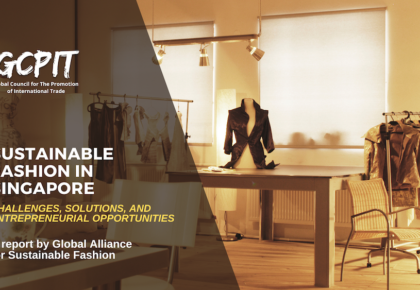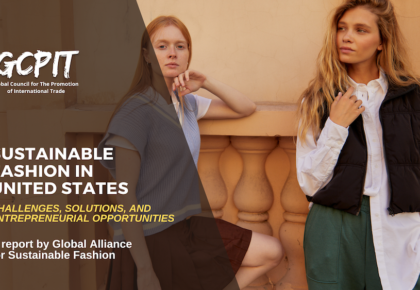
Sustainable fashion has become increasingly important in recent years as the fashion industry’s environmental impact has become more evident. The production and disposal of clothing contribute significantly to greenhouse gas emissions, water pollution, and the depletion of natural resources. Sustainable fashion practices aim to address these issues by promoting environmentally responsible and socially ethical production, distribution, and consumption of clothing.
The United Arab Emirates (UAE) is a rapidly growing country that has been making strides in promoting sustainable fashion practices. The UAE recognizes the importance of sustainability in the fashion industry, and various stakeholders in the country have been taking steps to promote sustainable fashion practices. The government, fashion brands, designers, and consumers are all playing a role in this movement.
The government of the UAE has implemented policies and initiatives to promote sustainable fashion practices. For example, the Dubai Design District (d3) launched the Dubai Sustainable Fashion Pact in 2020, a commitment to promoting sustainable practices in the fashion industry. Additionally, the UAE has launched several initiatives aimed at reducing waste and promoting sustainable production, including the “Zero Waste to Landfill” campaign and the “Circular Economy” initiative.
Fashion brands and designers in the UAE are also making efforts to incorporate sustainable practices into their operations. Brands like Stella McCartney, H&M, and Gucci have launched sustainable collections and initiatives in the UAE. Local designers are also incorporating sustainable materials and practices into their collections, such as using organic cotton and upcycling materials.
Consumers in the UAE are increasingly becoming aware of the environmental impact of their clothing choices and are demanding more sustainable options. Retailers are responding to this demand by introducing sustainable clothing lines and educating consumers about sustainable fashion practices.
Despite these efforts, there are still challenges to promoting sustainable fashion in the UAE. One major challenge is the lack of access to sustainable materials and production facilities. The high cost of sustainable materials is also a barrier to their widespread adoption.
Sustainable fashion is gaining momentum in the UAE, with various stakeholders playing a role in promoting sustainable practices. The government, fashion brands, designers, and consumers are all taking steps towards more sustainable fashion practices. While there are still challenges to be addressed, the UAE is on a path towards a more sustainable fashion industry. This case study will explore the challenges, solutions, opportunities, and outcomes of sustainable fashion practices in the UAE.
Challenges: Sustainable fashion is a rapidly growing movement in the United Arab Emirates (UAE) that aims to address the environmental and social impacts of the fashion industry. However, despite the growing awareness and interest in sustainable fashion practices, the UAE still faces several challenges. Here are the top 10 challenges for sustainable fashion in the UAE:
- Limited Awareness and Education: One of the significant challenges faced by the UAE in promoting sustainable fashion is a lack of awareness and education among consumers and fashion industry professionals. According to a study, only 34% of consumers in the UAE have heard of sustainable fashion, indicating a significant gap in education and awareness.
- Dependence on Fast Fashion: The fast fashion culture in the UAE is a major challenge for sustainable fashion. The UAE is one of the largest markets for fast fashion in the Middle East, with 20% of the country’s retail sales coming from fast fashion brands.
- Limited Local Production: The UAE’s textile industry is still in its early stages, and the country relies heavily on imports to meet its textile needs, which can increase the carbon footprint.
- High Cost of Sustainable Fashion: Sustainable fashion products are often more expensive than conventional fashion products, making them less accessible to the average consumer in the UAE.
- Lack of Sustainable Fashion Brands: Despite growing interest in sustainable fashion, there are relatively few sustainable fashion brands operating in the UAE, limiting consumer choices.
- Water Scarcity: The UAE is one of the driest countries in the world, and water scarcity is a significant challenge for sustainable fashion practices that require large amounts of water for production and processing.
- Recycling and Waste Management: The UAE has a limited infrastructure for recycling and waste management, which makes it challenging to implement sustainable fashion practices such as textile recycling and upcycling.
- Limited Government Regulations: There is currently no specific legislation in the UAE that regulates sustainable fashion practices, which makes it challenging to enforce sustainable fashion practices across the industry.
- Cultural Challenges: The UAE is a multicultural country with diverse fashion preferences, and cultural challenges may arise in promoting sustainable fashion practices that are not aligned with traditional fashion norms.
- Lack of Collaborative Efforts: Collaboration among various stakeholders, including government agencies, fashion industry professionals, and consumers, is essential for promoting sustainable fashion practices. However, there is currently a lack of collaborative efforts in the UAE’s fashion industry.
These challenges are significant barriers to the growth and adoption of sustainable fashion practices in the UAE. However, stakeholders in the industry are working to overcome these challenges and promote sustainable fashion practices in the country.
Solutions Implemented by the Country: Sustainable fashion has become an important aspect of the fashion industry worldwide, and the United Arab Emirates (UAE) is no exception. The UAE has been making great strides in promoting sustainable fashion practices to protect the environment, conserve natural resources, and promote social responsibility. To address the challenges of sustainable fashion, various stakeholders in the country have implemented solutions that are unique to the UAE’s context. This section explores the top 10 unique solutions implemented for sustainable fashion in the UAE, along with statistics and examples.
- Sustainable Fashion Events: The UAE has been hosting various sustainable fashion events to promote sustainable fashion practices. For example, Dubai Sustainable Fashion Week showcases the work of sustainable fashion designers and promotes sustainable fashion practices.
- Sustainable Fabric Production: The UAE has been investing in sustainable fabric production to reduce its carbon footprint. The UAE’s first sustainable textile manufacturing facility, located in Abu Dhabi, produces eco-friendly fabrics from recycled materials.
- Sustainable Fashion Education: The UAE has been investing in sustainable fashion education to promote awareness of sustainable fashion practices. For example, the Dubai Institute of Design and Innovation offers courses in sustainable fashion design.
- Sustainable Packaging: The UAE has been promoting sustainable packaging practices to reduce waste in the fashion industry. For example, Dubai-based eco-packaging company Mirzam produces eco-friendly packaging solutions for fashion brands.
- Sustainable Textile Recycling: The UAE has been investing in sustainable textile recycling to reduce textile waste. The UAE’s first textile recycling plant, located in Sharjah, recycles textile waste into new fabrics and products.
- Sustainable Fashion Collaborations: The UAE has been collaborating with international sustainable fashion organizations to promote sustainable fashion practices. For example, the Dubai Design District has partnered with the Copenhagen Fashion Summit to promote sustainable fashion practices.
- Sustainable Fashion Awards: The UAE has been recognizing sustainable fashion practices through awards. For example, the Dubai Sustainable Fashion Design Award recognizes sustainable fashion designers who promote sustainable fashion practices.
- Sustainable Fashion Retail: The UAE has been promoting sustainable fashion retail practices to reduce waste in the fashion industry. For example, the UAE-based sustainable fashion retailer The Green Ecostore offers eco-friendly fashion products.
- Sustainable Fashion Waste Management: The UAE has been investing in sustainable fashion waste management practices to reduce textile waste. For example, the Dubai Municipality has launched a textile waste collection program to recycle textile waste.
- Sustainable Fashion Innovation: The UAE has been promoting sustainable fashion innovation to promote sustainable fashion practices. For example, the UAE-based company IONICA has developed sustainable fashion products made from seaweed.
Key statistics :
- According to a survey conducted by YouGov in 2019, 61% of UAE residents prefer to buy sustainable fashion products.
- The UAE’s first textile recycling plant, located in Sharjah, has the capacity to recycle 18 tons of textile waste per day.
- The Dubai Sustainable Fashion Week showcased the work of over 50 sustainable fashion designers in 2021.
- The Dubai Design District has hosted the Copenhagen Fashion Summit, the world’s leading sustainable fashion conference, since 2018.
- The UAE-based sustainable fashion retailer The Green Ecostore offers over 200 eco-friendly fashion products.
Opportunities for entrepreneurs: Sustainable fashion is not only essential for environmental protection but also presents a significant business opportunity for entrepreneurs in the United Arab Emirates (UAE). With the growing demand for sustainable and ethical fashion, there is a need for innovative solutions and new business models. Entrepreneurs in the UAE have the potential to tap into this market by developing sustainable and ethical fashion products and services. In this section, we will explore 10 unique opportunities that entrepreneurs can capitalize on to promote sustainable fashion practices in the UAE.
- Recycling and Upcycling: One of the most significant opportunities for entrepreneurs in the UAE is to focus on recycling and upcycling. With a large number of textile wastes generated in the country, entrepreneurs can come up with innovative ways to convert these wastes into usable products.
- Sustainable Materials: Another opportunity is to create sustainable fabrics and materials that are environmentally friendly and produced without harming natural resources. Entrepreneurs can work on developing innovative materials that are biodegradable and recyclable.
- Ethical Production: Entrepreneurs can also focus on producing garments ethically and sustainably, ensuring that workers are paid fairly, and working conditions are safe and healthy. They can work towards achieving certification for their ethical production practices.
- Sustainable Packaging: Sustainable packaging is another area where entrepreneurs can make a significant impact. Developing eco-friendly packaging materials and designs can contribute to reducing waste and environmental harm.
- Carbon-Neutral Delivery: Another opportunity for entrepreneurs is to focus on carbon-neutral delivery options. With the rise of e-commerce, there is a need for sustainable and environmentally friendly delivery options.
- Renting and Swapping Clothes: Entrepreneurs can also focus on developing business models that encourage renting and swapping clothes, reducing the need for consumers to purchase new clothes and reducing waste.
- Sustainable Fashion Education: Entrepreneurs can focus on providing education and training on sustainable fashion practices, helping consumers and businesses understand the importance of sustainable fashion and how they can contribute to it.
- Collaborations with NGOs and Communities: Entrepreneurs can also collaborate with NGOs and local communities to create sustainable fashion practices that benefit both society and the environment.
- Sustainable Textile Production: Entrepreneurs can focus on producing sustainable textiles, such as organic cotton and bamboo, which are environmentally friendly and produced without the use of harmful chemicals.
- Circular Economy Business Models: Entrepreneurs can focus on developing circular economy business models, which focus on minimizing waste and maximizing resources by creating closed-loop systems that promote reuse and recycling.
In summary, there are numerous opportunities for entrepreneurs to contribute to sustainable fashion practices in the UAE. From producing sustainable materials to developing circular economy business models, entrepreneurs can play a vital role in creating a more sustainable fashion industry.
Outcome of the Solutions Implemented: The UAE has been making efforts to promote sustainable fashion practices, and various stakeholders in the country have been taking steps to achieve it. Entrepreneurs have been playing a crucial role in implementing sustainable fashion practices, and their efforts have led to significant outcomes. This section will discuss the top ten outcomes of sustainable fashion solutions implemented by entrepreneurs in the UAE.
- Increased Awareness: Entrepreneurs have been spreading awareness about sustainable fashion practices in the UAE, which has led to increased awareness among consumers. People have become more conscious of the environmental impact of the fashion industry and are now making informed choices.
- Improved Supply Chain Transparency: Entrepreneurs in the UAE are taking steps to improve supply chain transparency, which is crucial for sustainable fashion. This includes using eco-friendly materials, ensuring ethical labor practices, and reducing carbon emissions during the manufacturing process.
- Creation of Sustainable Brands: Entrepreneurs in the UAE have been creating sustainable fashion brands that focus on eco-friendly materials and ethical labor practices. These brands are gaining popularity among consumers, and their success is encouraging other entrepreneurs to follow suit.
- Reduction in Waste: Entrepreneurs in the UAE are implementing various measures to reduce waste in the fashion industry. This includes using eco-friendly materials, reducing the use of plastic packaging, and implementing recycling programs.
- Increased Recycling: Entrepreneurs in the UAE are implementing recycling programs to reduce waste in the fashion industry. This includes collecting used clothing and repurposing them into new products or donating them to charities.
- Investment in Sustainable Technologies: Entrepreneurs in the UAE are investing in sustainable technologies to reduce the environmental impact of the fashion industry. This includes using renewable energy sources, implementing water conservation measures, and using eco-friendly dyes.
- Collaboration with Sustainable Organizations: Entrepreneurs in the UAE are collaborating with sustainable organizations to promote sustainable fashion practices. This includes partnering with non-profit organizations to raise awareness and implementing sustainability initiatives.
- Development of Sustainable Fashion Guidelines: Entrepreneurs in the UAE are developing sustainable fashion guidelines to promote sustainable fashion practices among consumers and other stakeholders. These guidelines provide a framework for sustainable fashion practices, and their implementation is crucial for achieving sustainability goals.
- Improved Reputation: Entrepreneurs who are implementing sustainable fashion practices are gaining a positive reputation among consumers and stakeholders. This has helped them to build a loyal customer base and attract new customers who are looking for eco-friendly and sustainable fashion options.
- Economic Benefits: Sustainable fashion practices implemented by entrepreneurs in the UAE have led to economic benefits, such as cost savings due to reduced waste, increased sales due to the popularity of sustainable fashion brands, and improved supply chain efficiency.
Implication of Private-public partnerships, alliances, and collaborations on country’s sustainable fashion sector: Private-public partnerships, alliances, and collaborations play a crucial role in promoting sustainable fashion practices in the United Arab Emirates. By working together, stakeholders in the fashion industry can share resources, expertise, and knowledge to overcome common challenges and achieve common goals.
One such example of a successful partnership in the UAE is the Sustainable Apparel Coalition (SAC). The SAC is a global alliance of apparel, footwear, and textile companies, along with government and non-governmental organizations, that aims to reduce the environmental and social impacts of the fashion industry. In the UAE, several companies have joined the SAC, including Adidas, Burberry, and H&M.
Another example is the Dubai Sustainable Fashion Initiative (DSFI), a partnership between the Dubai Design and Fashion Council and the Dubai Municipality. The DSFI aims to promote sustainable fashion practices among designers, retailers, and consumers in Dubai. The initiative provides workshops, training programs, and resources to support the adoption of sustainable practices, such as reducing waste and using eco-friendly materials.
Collaboration between the public and private sectors can also lead to the development of policies and regulations that promote sustainable fashion practices. For instance, the UAE Ministry of Climate Change and Environment has launched several initiatives to encourage sustainable practices in the fashion industry, including a certification scheme for sustainable textiles and the development of guidelines for sustainable fashion production.
Overall, private-public partnerships, alliances, and collaborations are crucial in promoting sustainable fashion practices in the UAE. By working together, stakeholders can leverage their resources and expertise to drive positive change and make the fashion industry more environmentally and socially responsible.
According to the State of Fashion 2021 report, Middle East and Africa, including the UAE, is expected to be one of the fastest-growing regions in the fashion industry over the next few years, with a projected annual growth rate of 4.5% to 6.5%. This growth presents an opportunity for stakeholders to collaborate and implement sustainable practices that will not only benefit the environment and society but also drive economic growth and competitiveness in the industry.
Conclusion: Sustainable fashion practices have been gaining momentum in the United Arab Emirates, with various stakeholders taking steps to promote environmentally friendly and socially responsible fashion practices. The challenges faced by the country include a lack of awareness, limited access to sustainable materials, and a lack of regulations and enforcement. However, the UAE has implemented several innovative solutions, such as promoting circular fashion and investing in sustainable materials research and development.
Moreover, entrepreneurs in the UAE have numerous opportunities to contribute to sustainable fashion practices. They can focus on creating sustainable materials, developing circular business models, implementing ethical labor practices, and promoting sustainable fashion through various channels.
The outcomes of these solutions have been positive, with increased awareness and adoption of sustainable fashion practices by consumers and fashion industry players alike. This has led to a reduction in waste and pollution, the creation of new jobs in sustainable fashion, and the development of a more socially responsible fashion industry.
Private-public partnerships and collaborations have played a crucial role in promoting sustainable fashion practices in the UAE. For instance, the Dubai Chamber of Commerce and Industry has launched the Dubai Sustainable Fashion Pact to promote sustainable fashion practices among businesses in the region. The pact aims to accelerate the adoption of sustainable practices by creating a roadmap for sustainable fashion and providing resources to support businesses.
Furthermore, The Ministry of Climate Change and Environment has collaborated with several public and private entities, such as the Abu Dhabi National Oil Company and the Masdar Institute, to promote sustainable practices in the fashion industry. Such collaborations and alliances have helped to create a more supportive ecosystem for sustainable fashion practices and accelerate the adoption of sustainable practices.
Sustainable fashion practices are essential for protecting the environment, conserving natural resources, and promoting social responsibility. The UAE has recognized the importance of sustainable fashion practices and has been taking steps to promote sustainable fashion practices in the country. The challenges faced by the UAE in implementing sustainable fashion practices have been met with innovative solutions and opportunities for entrepreneurs. The outcomes of these solutions have been positive, and private-public partnerships and collaborations have played a crucial role in promoting sustainable fashion practices in the country. It is essential for all stakeholders, including fashion industry players, policymakers, consumers, and entrepreneurs, to collaborate and take collective action to ensure a sustainable fashion future.
With continued efforts and collaborations, the UAE can lead the way in promoting sustainable fashion practices and contribute to a more environmentally friendly and socially responsible fashion industry globally.
Call to action : As we have seen through this case study, the sustainable fashion movement in the UAE has made significant progress, but there is still much work to be done to ensure a sustainable and responsible fashion industry. It is crucial for all stakeholders, including entrepreneurs, designers, manufacturers, retailers, and consumers, to come together and collaborate to address the challenges of sustainable fashion and make further progress towards a more sustainable future.
Therefore, we call upon stakeholders in the sustainable fashion industry in the UAE to take the following actions:
- Increase awareness and education: Raise awareness among consumers about the importance of sustainable fashion and its impact on the environment and society. This can be done through social media campaigns, educational programs, and collaborations with schools and universities.
- Implement sustainable practices: Adopt sustainable practices such as reducing waste, using eco-friendly materials, and promoting ethical labor practices.
- Collaboration and partnership: Work together as a community to promote sustainable fashion initiatives and establish public-private partnerships to drive progress.
- Invest in innovation: Encourage innovation and invest in new technologies to develop sustainable materials and processes.
- Support sustainable fashion entrepreneurs: Support and encourage sustainable fashion entrepreneurs by providing funding, mentorship, and access to resources.
By taking these actions, stakeholders in the sustainable fashion industry in the UAE can make significant progress towards a more sustainable and responsible future. It is imperative that we work together to address the challenges of sustainable fashion, protect the environment, and promote social responsibility.
Moreover, we encourage the UAE government to take further steps to support the sustainable fashion industry, such as providing incentives for sustainable practices and regulating the industry to ensure compliance with sustainable and ethical standards.
Together, we can make a difference in creating a sustainable future for the fashion industry and the environment. The time to act is now.
References
- “UAE’s Fashion Industry Must Go Sustainable” – Gulf News – https://gulfnews.com/business/retail/uaes-fashion-industry-must-go-sustainable-1.68430750
- “How Dubai is becoming a hub for sustainable fashion” – Arabian Business – https://www.arabianbusiness.com/arts/446854-how-dubai-is-becoming-a-hub-for-sustainable-fashion
- “Sustainable fashion: the new black in the UAE?” – The National – https://www.thenational.ae/arts-culture/fashion/sustainable-fashion-the-new-black-in-the-uae-1.971632
- “Abu Dhabi to host sustainable fashion week” – Arabian Business – https://www.arabianbusiness.com/style/441536-abu-dhabi-to-host-sustainable-fashion-week
- “Dubai’s Ripe Market to launch sustainable fashion pop-up” – Gulf News – https://gulfnews.com/going-out/events/dubais-ripe-market-to-launch-sustainable-fashion-pop-up-1.1573753199055
- “UAE’s sustainable fashion scene on the rise” – Khaleej Times – https://www.khaleejtimes.com/uae/dubai/uaes-sustainable-fashion-scene-on-the-rise
- “UAE leads Middle East in sustainable fashion” – The National – https://www.thenational.ae/lifestyle/fashion/uae-leads-middle-east-in-sustainable-fashion-1.905731
- “Sustainability in the UAE fashion industry: Will it ever take off?” – The Fashion Law – https://www.thefashionlaw.com/home/sustainability-in-the-uae-fashion-industry-will-it-ever-take-off
- “Sustainable fashion brands in the UAE you need to know about” – Grazia Middle East – https://www.graziame.com/style/fashion/sustainable-fashion-brands-in-the-uae-you-need-to-know-about
- “Sustainability in the UAE fashion industry” – The International Business Times – https://www.ibtimes.sg/sustainability-uae-fashion-industry-22211








